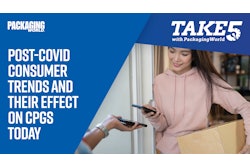For plastics recycling to work correctly, for example, it helps to have consistency in the use of identifiers for the different polymers, and for consumers to have some level of understanding of those identifiers, and for consistency in labeling claims about recyclability, and for recycling facilities to standardize what they can accept and process. Failure of any one of these can make the whole system less effective.
In a word, recycling in the U.S. is ripe for an overhaul, as indicated by several recent developments, including at least one high-profile lawsuit and important federal legislative proposals.
That lawsuit indirectly raises questions about what’s wrong with recycling in the U.S. It was brought by the environmental advocacy group Greenpeace, which has sued Walmart in California claiming that “the retailer has made false or misleading claims on the labels of many of its products about the recyclability of their packaging.” Despite Walmart’s longtime efforts to make packaging more sustainable and environmentally responsible, Greenpeace makes it out to be a villain, alleging that the retailer’s label claims of “recyclability” are giving consumers bad information.
We’ll see how the case comes out in the end, but in the meantime the interesting question the controversy raises is whether the lack of availability of recycling facilities is Walmart’s fault or the fault of other parties, or is due to a lack of recycling infrastructure.
Directly at issue in the case are the correct way to make label claims about environmental matters. The State of California has adopted the Federal Trade Commission’s Guides for the Use of Environmental Marketing Claims, which you may be familiar with as the “Green Guides.” These federal guidelines set out parameters by which label claims about various environmental characteristics can be made in a way that isn’t misleading to consumers. A misleading claim would render the product violative of federal consumer protection law.
Specifically, the Guides recite that an unqualified claim that a package or product is “recyclable” should only be made where recycling of that package is available to a “substantial majority” of the population, which FTC says is 60% or more. If it isn’t, you could still make the claim that it’s recyclable, but your claim would need to be qualified by appropriate words or phrases to explain the limitations.
Greenpeace alleges, however, that Walmart “provided no qualifications for some” of the products it claimed were recyclable, and for others it “provided the same two fine print qualifications for each Product: “check locally” and “not recycled in all communities.” Greenpeace claims that “the fine print is approximately 2-point font, making it difficult for consumers to notice, yet alone read. In addition, … a “check locally” disclaimer is per se deceptive under the Green Guides.”
PACK EXPO Las Vegas and Healthcare Packaging EXPO (Sept. 27-29, Las Vegas Convention Center) will reunite the packaging and processing community, offering new products, technologies and solutions, while implementing up-to-date protocols for a safe and successful in-person event. Attendee registration opens in May.
Greenpeace further asserts that “By including the language ‘check locally’ and ‘not recycled in all communities’ together, [Walmart] is incorrectly implying that consumers need only check locally to determine whether recycling facilities exist in their community, not whether the recycling facilities in their community actually recycle the [p]roducts. The FTC has explicitly stated such an implication is deceptive. . . . Worse yet, even if a consumer followed [Walmart’s] directive to check locally to determine whether a facility actually recycled the [p]roducts, many recycling facilities in California (which are often operated by private companies) have no duty to provide such information and are unwilling to answer detailed consumer inquiries about their recycling capabilities.” Greenpeace is asking the court to order Walmart to halt what it calls its false and deceptive practices.
Walmart has denied Greenpeace’s claims and moved to have the case dismissed on various grounds, most notably that it’s market conditions and the actions of other parties that are the biggest reasons more plastics are not recycled.
And steps could be underway to address just that issue. In recent years, there have been multiple federal bills proposed that were aimed at improving plastics recycling nationwide. One leading example, called the Realizing the Economic Opportunities and Value of Expanding Recycling (RECOVER) Act, was introduced again in April and would fund state and local investments in improving their recycling programs. Lots of big packaging companies and the trade group PLASTICS are supporting the bill.
PLASTICS issued a release explaining that “The legislation would allocate federal grants to states and municipalities to invest in improving their recycling programs and infrastructure, including upgrading plants that receive and process recyclables and enhance the recovery and collection of materials.”
These concepts seem to be on the minds of many right now. In February, the Consumer Brands Association—formerly known as the Grocery Manufacturers Association, the leading national trade association for the consumer packaged goods industry—issued a report identifying problems with recycling systems and advocating federal-level solutions. CBA’s Blueprint for America’s Recycling System is a product of the group’s Recycling Leadership Council consisting of a combination of other groups (including PW’s parent PMMI) that represent “consumer-facing industries, packaging companies, and the recycling ecosystem.” The group notes that there are almost 10,000 recycling systems in the U.S., and the report says, “The RLC is calling for a national strategy on recycling and policy action in three areas: data collection; system standardization and harmonization; and financing and end-market development.”
What all this means for your business remains to be seen, of course, but what’s already clear is that recycling is on many minds, and the trend seems to be toward enhancing and expanding recycling systems. Change could come within the next year or two.
Eric Greenberg can be reached at [email protected]. Or visit his firm’s Web site at www.ericfgreenbergpc.com.
INFORMATIONAL ONLY, NOT LEGAL ADVICE.

























